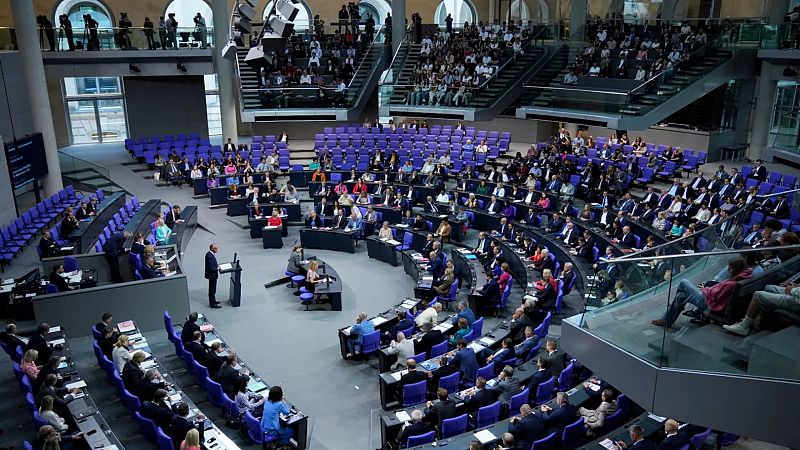Growing Concerns Over Germany’s Internet Reporting Policy
More and more professionals, including lawyers, politicians, and journalists, are raising concerns about the German government’s approach to handling online content through its reporting centres. These centres, often funded by the state or even directly run by it, aim to combat “hate and agitation on the internet.” However, there is a growing fear that legitimate opinions might be misclassified as hate speech.
In some instances, police have reportedly conducted early morning raids on the homes of ordinary citizens who shared memes that were critical of the government. This has happened during previous coalition governments, where such actions were seen as targeting individuals for expressing dissenting views.
Two prominent reporting NGOs in Germany have been designated as “trusted flaggers” under the EU’s Digital Services Act (DSA). These organisations are responsible for identifying and removing illegal content from the internet. However, legal experts argue that these groups may be too closely aligned with political interests, potentially leading to the removal of content that should be protected as free expression.
Lawyer Ralf Höcker described the situation as a form of state censorship, likening it to the Ministry of Truth. He pointed out that these trusted flaggers are semi-governmental entities, receiving substantial state funding, which raises questions about their impartiality. According to Höcker, there are numerous connections between these organisations and political parties, which he believes could lead to serious consequences.
Scepticism Within Political Parties
Scepticism is also growing within the ruling CDU party. Saskia Ludwig, a CDU lawmaker, expressed her concern over the policy, stating that it is not acceptable to continue down this path. She highlighted that commissioning private companies to monitor online content is met with doubt among many in her parliamentary group.
SPD MP Parsa Marvi explained his party’s stance, emphasizing that platforms and social media are not lawless spaces. He stressed that criminal offences like hate speech, defamation, and threats must be taken seriously. The European Commission introduced the trusted flagger system to ensure that such content can be reported effectively.
Marvi clarified that the trusted flaggers do not delete content themselves. Instead, they report based on guidelines and legislation, leaving the final decision to the platforms. However, because these reporting centres are often seen as credible, platforms tend to act quickly when they flag content, fearing potential penalties.
Government-Funded NGOs and Their Influence
The pressure on online platforms to remove content is significant, given the influence of these government-funded NGOs. These centres also verify that the content is deleted after a request, further increasing the pressure on platforms to comply.
Freedom of expression is a fundamental value in Germany, and the highest court often steps in to determine whether an opinion is still permissible. During the second lockdown of the coronavirus pandemic, the German government reintroduced the offence of lèse majesté, making criticism of the government that constitutes insult or defamation subject to criminal prosecution.
Section 188 was amended to include “insult” alongside “defamation” and “slander,” extending the offence to local politicians. Hundreds of complaints were filed by politicians across different parties under this amendment, with notable figures like Robert Habeck of the Greens filing hundreds of complaints.
The Role of Trusted Flagger Organisations
Some of these reports are handled by trusted flaggers like Respect, which sends reports directly to the Federal Criminal Police Office, even though this is not required by the DSA. CDU politician Saskia Ludwig is concerned about this development, recalling her experiences in the GDR and expressing skepticism about the creation of portals that allow anyone to report others.
Ludwig pointed out that these trusted flaggers are not adequately controlled, which raises further concerns about their independence. She fears that only state-approved opinions will be accepted, while opposing views could be silenced.
Funding and Independence Issues
Documents obtained by Euronews reveal that the Respect reporting centre, appointed as a trusted flagger, receives up to 95% of its funding from the government. This money comes from the “Demokratie Leben” programme of the Ministry of Family Affairs. German MEP Friedrich Pürner requested proof of this funding from the Network Agency, which confirmed that public or semi-public organisations can be approved as trusted flaggers, regardless of their funding sources.
Pürner, who previously belonged to BSW, expressed concerns about the lack of scrutiny into the state’s influence on these organisations. He fears that only opinions aligned with the state will be tolerated, while others could be suppressed.
His own experience during the pandemic highlights these concerns. As a doctor from Bavaria, he was transferred after criticising the government’s coronavirus policies. This incident reflects a broader pattern of perceived suppression of dissenting voices.
Conclusion
The debate surrounding Germany’s internet reporting policy continues to intensify. With growing concerns about the independence of trusted flaggers and the potential for censorship, the future of free expression in the digital space remains uncertain. As more countries consider similar measures, the need for transparency and accountability becomes increasingly important.

